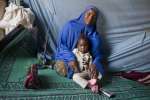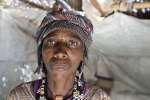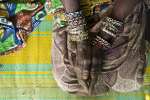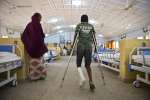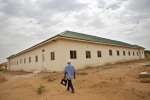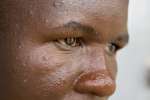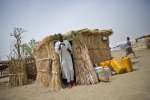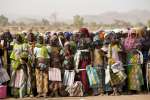More than 6,000 people flee to Niger from north-east Nigeria
News Stories, 11 June 2013
DAKAR, Senegal, June 11 (UNHCR) – The UN refugee agency said on Tuesday that the crisis in north-eastern Nigeria has forced more than 6,000 mainly women, children and older people to seek safety in neighbouring Niger.
"Those UNCHR has spoken to say they escaped for fear of being caught in the government-led crackdown on insurgents linked to the Boko Haram sect, particularly in the Baga area of northern Nigeria, close to the Niger border," spokesman Adrian Edwards told journalists.
Refugees report that air strikes by government forces are continuing from time to time, and that planes are regularly flying over the states of Borno, Yobe and Adamawa where a state of emergency has been in force since May 14.
"People arriving in Niger also mention the increasing presence of roving armed bandits in several states in Nigeria. Rising commodity prices coupled with pre-existing food insecurity is also becoming a major concern for the populations of the affected states," UNHCR's Edwards noted.
Niger has so far received 6,240 people, comprising Nigerian nationals (2,692) returning Niger nationals (3,544), and 94 people of other nationalities (mainly Chadians). Once their families are secure in Niger, men are returning to Nigeria to work and to sustain their families' needs.
Many new arrivals have walked into Niger, taking refuge in villages located close to the border. Others, who fled areas located as far as 300 kilometres away, such as Maidougouri in Nigeria, have used cars or motorbikes.
New arrivals are either renting houses or staying with host families, who are themselves living in very precarious conditions. UNHCR staff have also met some Nigerian families living out in the open in border villages.
Edwards said that although the local population has welcomed the new arrivals, the presence of newcomers is also putting a strain on meagre local food and water resources. Niger struggles with food insecurity due to years of drought. UNHCR plans to deliver some aid to the new arrivals as well as to the host community. The agency is also helping the local authorities to register new arrivals.
UNHCR has monitored the arrival of new arrivals in Cameroon and Chad in the past weeks. There are 155 Nigerian asylum seekers in Chad along with 716 Chadian nationals. In Cameroon there are 1,200 returned nationals.
Meanwhile, the security situation in Nigeria remains extremely difficult. UNHCR is not present in the parts of the north-east that are under a state of emergency. Information about the humanitarian situation in the north-east is consequently limited.
In Adamawa state, insecurity is reportedly worst in the areas of military operations close to the Cameroonian border. Most of the north-east suffers from chronic and periodic insecurity due to conflict and insurgent activities.
By Hélène Caux in Dakar, Senegal




